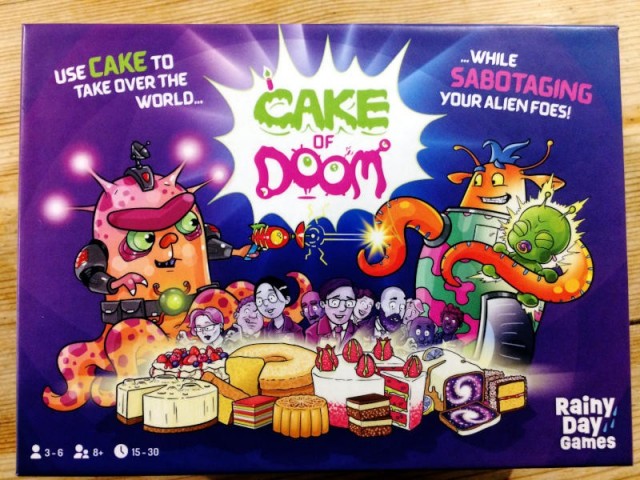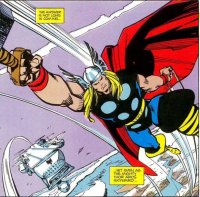Yet another way to take on the mantle of battling wizards, Godsforge may not have a firm grasp on its arcane lore.
The gold standard among combat card games has been Magic: The Gathering for the past 30 years. There have been many attempts to duplicate its clean and versatile foundation, but most of them have fallen by the wayside of Wizards of the Coast's everpresent monster. With that in mind, in recent years, card games have begun to avoid the collectible model and instead provide complete games that emulate Magic's model in a more constrained space. Many deckbuilders, like Rune Age, have tried this approach, while Fantasy Flight's LCG model, where all cards of new expansions are gained at once, has been another angle. Godsforge is the first example I've run across where designer, Brendan Stern, has jumped right into the pool with Richard Garfield and his original source of inspiration, Tom Jolly (designer of Wiz-War), and decided to create a game about battling wizards and the monsters, weapons, and fireballs they wield springing from the cards in their hands. That takes some gumption, given the steep hill to climb and the inevitable comparisons that will be made, many of which I'm going to make in the following paragraphs. But Stern's primary note of difference was to include yet another aspect of randomness, aside from the inevitable scenarios created by drawing from a facedown deck, by introducing dice to the overall equation.
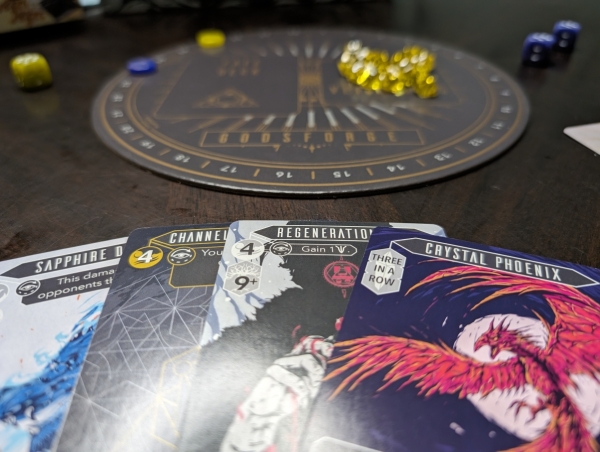
In Godsforge, you're a wizard (Harry!) just like you are in Wiz-War or Magic, but rather than depending on resources like mana with which to cast your lightning bolts or create your golems, you're relying on a set of four dice and some very forgiving rules by which to play your one card per turn in the hopes of whittling down your opponent. I say that in singular because, despite being playable by up to six players (with the two expansions), your only target during the game is the player to your left and, in turn, the only player you need to defend against is the one to your right. So it is a multiplayer game, but with a fairly narrow application of that status. Similarly, it is a card game, but the roll of the dice will determine which card(s) you can play on any given turn. If that sounds clumsy to you, don't worry. I had that same consternation when I first cracked open the box and began to sift through the contents. How often would I end up with cards that simply gave me more resources with little board impact? (Mana flood.) How often would I end up with cards stuck in my hand that couldn't be played? (Mana screw.) How often would I curse the dice because I had cool stuff staring me down from my hand for a few turns while my opponent to the right was annihilating me with his Lightning Sword? Well, not as often as you'd think; again due to the liberal rules surrounding those dice.
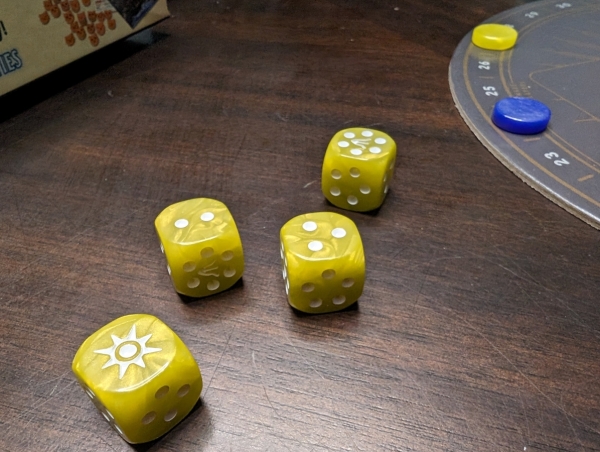
Everyone begins a round with a hand of four cards and, simultaneously, everyone rolls their four dice in the Forge Roll phase. The cards have various costs to be put into play, from typical numbers (2-11) found by rolling those results or adding other numbers together to achieve them, to rolling things like sequences (2, 3, 4, 5) or twos, threes or fours of a kind. Flat out, you're allowed to re-roll up to two dice each time you roll. But 1s are wild and can be treated as any other result or get you a Veilstone, while 6s can also get you a Veilstone, in lieu of counting as a 6. The stones are a currency that can be used to change a die by 1 pip per stone (changing a 3 to a 4, for example.) So, it's really not that difficult to achieve the roll you're aiming for, as long as you're not trying to get four of a kind on your first roll of the first round or something like that. The cards you're playing are either Spells, which are one and done, or Creations, which are tools or minions that stay with you until another action removes them. Many of both have Reveal effects, which happen once when the card is first played. Others have Upkeep effects, which occur in that opening phase of each round (Upkeep, Forge Roll, Reveal, Attack.) So you can produce a well varied number of results on each turn and in each game, especially considering that the 56 card deck in the base game has only three duplicates (Veilstone Beacon, Malachite Manticore, and Volcanic Sphinx.) That's a good thing because normally each player can play only one card per round, which can seem like a pretty severe limitation. But given that Creations stay in play from round to round and are normally quite difficult to remove, your cards do tend to begin playing off one another, like the tableau you create in your average game of Magic.
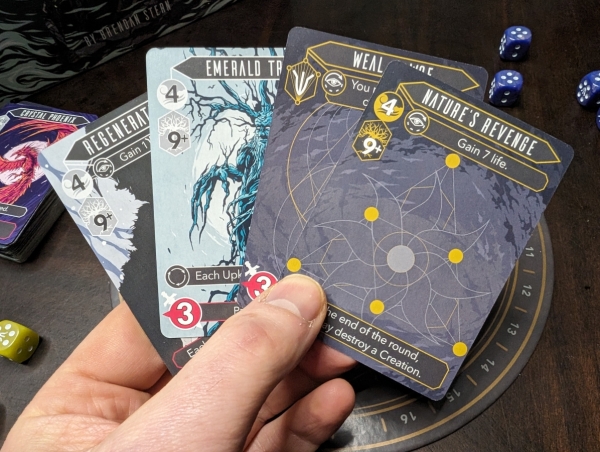
The aforementioned Sphinx is a good example. It not only increases your hand size by one, but also does 3 damage each round to your target or 6 if you played a Spell this round. The far-easier-to-forge Spawn of Flame only does 2 damage to your target in the Attack phase, but does allow you to play a second card on the turn you reveal it, which can be another Creation or a Spell. That spell could be utility, like Veilstone Thief, which allows you to either gain four Veilstones or steal up to that many from any number of players or it could be more, uh, direct like Elemental Storm which deals 8 damage and 5 more for every two Veilstones you spend when you play it. If that sounds like games can go quite quickly, you're right. Popular conception is that the game is usually played in 20-30 minutes and we found that to be pretty accurate, although some proceed even faster than that, depending on how many direct damage spells come out. In games with three or more, once one player is knocked out, each player takes another 7 damage at the end of each round thereafter to speed the game along so that someone's not sitting out for too long. If that, in turn, sounds rather arbitrary, it absolutely feels that way initially, although you do learn to try to compensate for it with various Creations once it's obvious that someone is on their last legs. In that respect, the game doesn't lack strategy even when it is obviously designed to be played at a rapid pace.
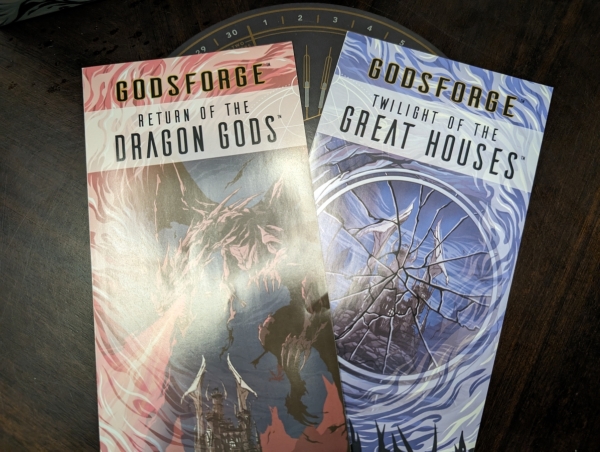
The two expansions- Return of the Dragon Gods and Twilight of the Great Houses -add a couple mechanisms that make their cards only slightly more complex. Dragon Gods introduces Upgrades, in which you can continually enhance your Creations with Veilstones to make them even more powerful, while Houses adds the very minor "Can't play Creations" to a few cards, but mostly focuses on the Great Houses themselves. These give a constant ability to each player at the start of the game, such as The Three Wishes starting the game with three Veilstones and not allowing any of your stones to be stolen or The Bright Blade enhancing the attack power of your Creations. There are 16 of these Houses, so the variety of abilities is solid. Speaking of variety, with 53 unique cards in the base game, plus 54 uniques in Dragon Gods (one copy of Veilstone Beacon makes an appearance there) and another 47 unique cards in Houses, combining all three together (as any proper Wiz-War player would be inclined to do!) makes for a wide spectrum of combinations and gameplay results that means you could be playing for quite some time before seeing all the cards available, on top of what changes you might choose to add with Houses.
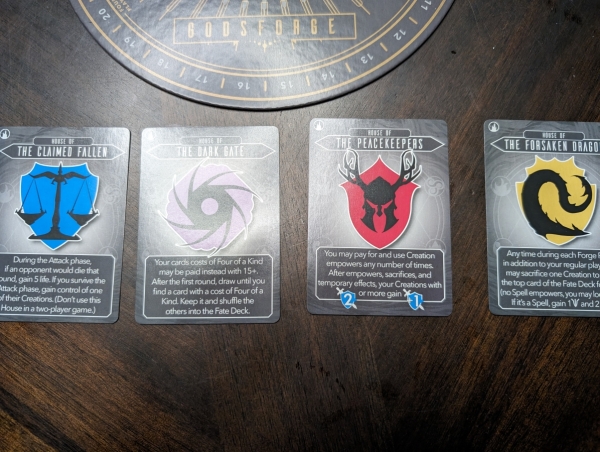
The main issue I ran into overall is one of what the game seems to be trying to say. While it's nominally a variation on Magic, the constraint of playing only one card per turn makes it feel less versatile in actual gameplay. Of course, it's also not a CCG, which is a good thing for all of our wallets and which means it's also not the fabled/dreaded "lifestyle game", in which the compulsion to keep up with a meta (and keep spending money!) drives many players away (former tournament player waving tiny flag here) or deters them from participating at all. Godsforge is obviously presented as a self-contained game. However, like many games of this ilk, it feels like it's intending to be something more. FFG's base game of Wiz-War is fun. It's even more fun with one, two, or three expansions tacked on. In that same vein, Godsforge has expansions and it presents a system that can be further built upon. But it also feels constrained by the gameplay to continue to be a 20-30 minute game. In that respect, it feels conflicted. That conflict is exacerbated by the backstory. Your background is that you're a wizard who's representing one of those Great Houses (even when not using the expansion) and you're vying for control of the Godsforge; the sole remaining source of all magic known as Etherium (the flavor term for rolling a 1 on any of the dice.) Combine that parallel to Richard Garfield's planeswalkers invoking the power of elements and monsters and add Dragon Gods returning and Great Houses failing and you have something that seems to aspire to be something far more than a bunch of wizards running around a maze trying to steal each others' stuff and kill each other for good measure a la Wiz-War.
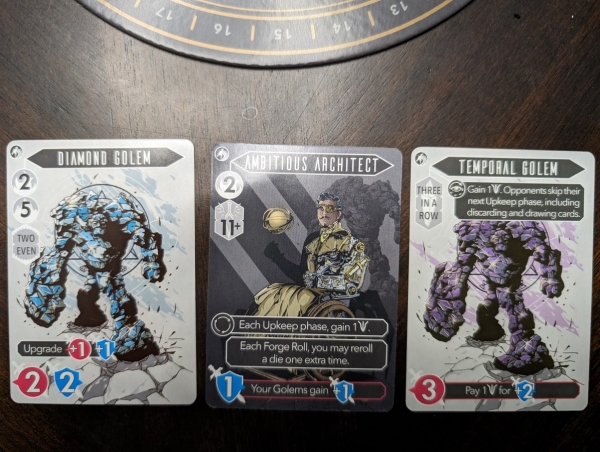
But if you're only engaging in this grand story for 20 minutes and sometimes even less than that, the game arcs toward the feel of what most gamers refer to as a "filler"; something to be played between or before longer and more grandiose ventures into the cardboard universe. If you manage to topdeck an Elemental Storm and successfully cast it on round two, such that any other damage I take puts me out of the game (four players start with only 20 health, like MTG) and then the rest of you suffer a third of your health in the (likely) one or two remaining rounds, such that the game is over in 10 minutes or even less, that's a lot less expansive a result than you'd expect from a game with that many high fantasy aspirations as presented in that backstory. In that respect, it feels like the game is suffering from an identity crisis in which it doesn't really know where it fits in the gaming sphere. Are you inviting your friends over for a full night of Godsforge or are you just playing it with three people who arrived early while waiting for the rest of your group to show up? Does that matter when you're all enjoying it, no matter how long it takes? Maybe not. But as much as I enjoyed the game, I couldn't help but feel like some of our sessions were just a bit... off. The reason cited on the Kickstarter page for this focus on rapid gameplay is that most gamers don't like waiting for their turn. I, of course, am not one of those gamers, as I've noted before, since the social aspect of playing a game with others means that I'm not concerned about not being the center of attention for a couple minutes.
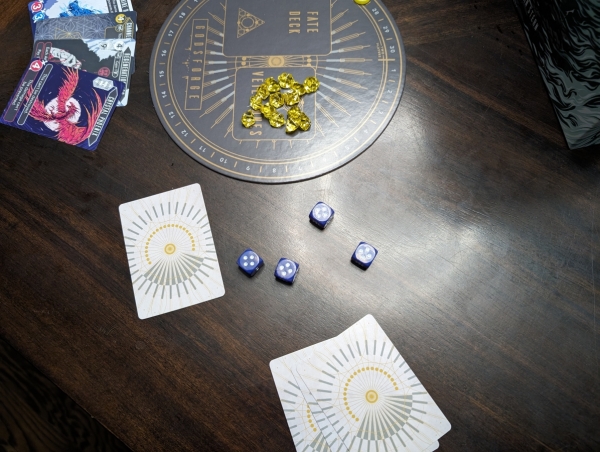
I don't mind the combination of dice and cards. I don't think the variance introduced by the former genuinely impedes the function of the latter. But, again, that's in part because of the extremely forgiving compensation rules (the wild results on the dice, the Veilstones, the ability to reroll any two dice every time you roll(!)) Were those rules introduced because the first edition felt like too many turns passed where you couldn't play anything? Or were they always present because playtesting revealed that from the get-go? Does it feel better to know that the overall system was an inhibition that needed to be patched from the very beginning or would the game actually be better if the dice were the supreme arbiter, outside of Veilstone modification? I suspect that the answer to that last question is that, no, the game would not be better to sit there with the equivalent of mana screw for three straight rounds while your opponents were summoning Paladins and Dragons and Veil Harps with abandon. But that question extends to the combat situation. Since you're only able to focus on one target and, in turn, can only be focused upon by one other player, the converse of free-for-all games can emerge. In the latter, it's often one player that gets ganged up on by multiple others, in response to either a perceived powerful position or a weak one. But in this case, if the player to your right (i.e. the one attacking you) drew a series of powerful Creations and is chewing you up while you didn't have that luck and are trying to effect anything upon your target before you die, it can feel quite similar. Again, with a game that plays this quickly, getting knocked out early in one game can easily be remedied by playing another one. But then the question arises as to why you didn't just play one longer game where people felt like they were involved for a much longer time? That brings us back to that question of the game's identity.
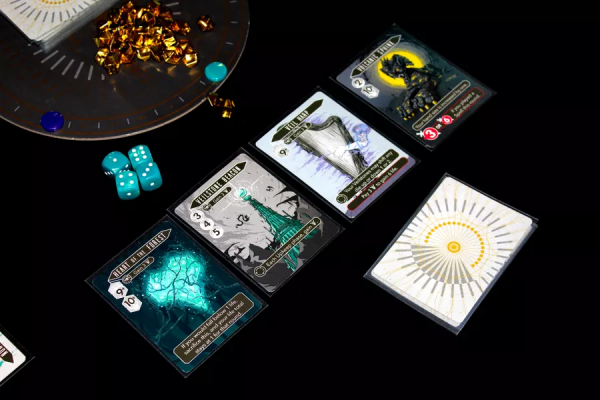
That question isn't particularly enhanced by the game's artwork. While the line art is nicely presented, the two-tone color process of the Creations and the flat gray with gold diagrams of the Spells doesn't present the same kind of visual appeal that you'd find in other fantasy card games like Rune Age or Dominion. The fact that all of the creatures and items that have variations are the same picture but with color differences only accentuates this. In most cases, you're remembering those cards as the red attack circles and the blue defend circles presented on them and not reveling in throwing down a Necropotence or something similarly artistically visceral. As Atlas Games is a much smaller company than WotC, it's totally understandable that they'd be more restrained on the greatest cost of any card game, which is art commissioning and the printing process required for higher-end production. The presentation of Godsforge is totally in line with the price point that I think Atlas is aiming for and there's certainly nothing to complain about in that respect, as the cards are well-made, the dice are easy to read, and the health-tracking board is perfectly pragmatic and functional. It's simply not the visual statement that other card games like, say, Tyrants of the Underdark or Dune: Imperium make. Again, there's nothing wrong with that, but then one wonders if the game with this much story and variety intended to be a 20 minute "filler"? Speaking of filler, one note that has to be called out is the obvious care taken by Atlas in that production, in that many of the game's components and packaging are either made of recycled materials or are intended to have less impact on this globe of ours. That's a laudable approach, no matter what you may think of the game.
Bottom line: I enjoyed the games that I've played of it, ranging from 2- to 5-player, and I'd certainly be willing to play again (my Ambitious Architect with my Arcane and Veilstone Golems was kind of a monster that I'd like to try to recreate in true, Mary Shelley fashion...) Will it come off the shelf over similar offerings? I can't quite say that. Like the identity/role of the game itself, let's just say I haven't quite found my way to it yet.
A copy of the game and both expansions were provided by the publisher.
 Games
Games How to resolve AdBlock issue?
How to resolve AdBlock issue? 














